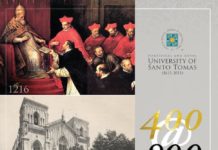WITH CONGRESS apparently railroading the passage of the divorce bill, the Catholic Church is left alone in the fight to protect the sanctity of marriage.
At present, divorce is just a step away from being approved in the House of Representatives. And with Speaker Pantaleon Alvarez co-authoring the bill, it is most likely that it will soon make its way up to the Senate. Not to mention that Alvarez is the secretary general of PDP-Laban, the administration party which controls a ‘supermajority’ in the lower house.
The country’s bishops have been very vocal against divorce, branding it as “anti-family.” They urged lawmakers to enact laws that would strengthen the family instead of providing an easy way out when marriages become difficult.
It is saddening, however, that as they seem to be alone in this fight, confusion and ambiguity surround the stand of their own shepherd of the flock, that is the Pope, on the issue of divorce. This is through his exhortation Amoris Laetitia, which gives local bishops the ability to decide whether divorced or remarried Catholics in their respective dioceses can take the Holy Communion.
St. John Paul II reaffirmed in his exhortation Familiaris Consortio that the divorced and remarried cannot receive communion as “their state and condition of life objectively contradict that union of love between Christ and the Church which is signified and effected by the Eucharist.”
He added that for the Church to allow them to be admitted to the Eucharist would lead the faithful to error and confusion on her teaching on the indissolubility of marriage.
Pope Francis in contrast is not this clear on his stand. His aim, he has often said, is to extend the Church’s mercy even to the divorced and remarried. This can be viewed, however, as a softening on the part of her teachings and of providing a leeway, which has drawn questions as to whether the magisterium of the Church has changed.
Despite calls for the Pope to “dispel all ambiguity” in Amoris Laetitia, particularly by cardinals of the Church, he has paid no response to the points raised for clarification and this choice has left bishops and parish priests all over the world with their own interpretations on how to carry out this new teaching.
German bishops, for example, have joined the bishops of Malta and Buenos Aires, the archdiocese where the Jesuit Pope came from, in paving the way for the divorced and remarried to communion.
In contrast, US bishops like Archbishop Charles Chaput of Philadelphia have issued guidelines that “welcome” remarried Catholics and divorcees to parishes but forbid them from receiving communion unless they’re abstinent or living as brother and sister.
In the Philippines, no bishop has vigorously defended Amoris Laetitia. Most maintain a polite silence when asked about the papal document.
Unless the Holy Father opens dialogue and set things straight by a clear definition of his stand, this confusion might prolong and eventually, weaken the Church’s stance on divorce.
All this cloud of confusion does not help at all in the present situation in the country, where the last stronghold against divorce in Asia and in the world is at the brink of legalizing it.
In the University setting, our bishops have also failed in finding an ally in the presidential bets of the Central Student Council Executive Board elections, who both backed divorce during their mandatory debate last April 3.
In a roundtable discussion with the Varsitarian, these hopefuls said their support for divorce is their personal belief, which does not reflect the stance of the whole council and of the University as a Catholic and pontifical institution.
While it is true that one man is not the whole council, how would one fulfill the mandate of the council’s constitution that is to “uphold the Christian ideals and objectives of the University” when their belief –which they said they are willing to release a statement in favor of –is something which the council is supposed to go against those of a Catholic university?
Most people would raise their eyebrows as to why our leaders being in favor of divorce have to be such an issue. For what it’s worth, it has to be, because the loyalty of leaders does not only belong to their people; it belongs as well to the identity of the institution that they represent.
And to say that leaders are supposed to only represent the stand of their constituents is both vague and lacking. For they should have the moral compass and ascendency to determine what is right and wrong, to embody what is right and to lead their people into it.
In his visit to UST in 1995, St. John Paul II urged the Filipino academic community to “reflect on the priority of the ethical over the technical, of the primacy of the person over things, of the superiority of the spirit over matter.”
He too, called on the Filipino youth to be men and women who are “capable of self-discipline, of committing themselves to the highest ideals, ready to change radically the false values which have enslaved so many young people and adults.”
For this, it is hoped that the newly elected student council will stand up and speak on this matter, for as representatives of Thomasians, it must not veer away from the teachings of the Church and abandon it in its fight against divorce—for our Thomasian identity is mainly rooted in UST’s Catholic identity.














